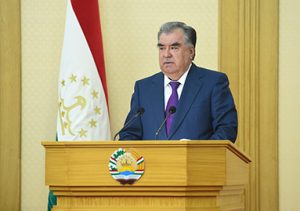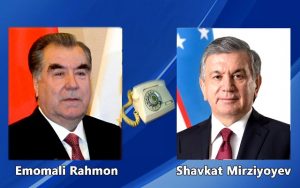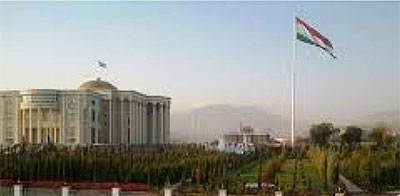History
Declaration of state independence. The state independence is an invaluable political achievement in the new history of Tajikistan. The Declaration of Independence of the Republic of Tajikistan was adopted during the intense political resistance at the Second Session of the Supreme Council of the Republic of Tajikistan (12th Convocation) on 24 August 1990.
The independence declared in this historical document was yet considered as “independence within the competence of the Soviet Union”, because the Republic of Tajikistan had the right to decide political, economic, social and cultural issues in its territory except the issues within the competence of the Union of the Soviet Socialist Republics.
The beginning of 90th of the 20th century was a period of unpredictable historical developments for the former Soviet Union and union republics. In fact, political phenomena and developments had been changing so quickly that even the highest leadership in those countries was not able to really comprehend the process.
The events of August 1991 demonstrated the final days of the superpower. Since then, republics began to realize the essence of independence and started endeavor and struggle for gaining full independence. Since it was clearly obvious that such political process would affect Tajikistan as well, it became necessary for amendment of the Declaration of 1990.
The situation was described in the Statement of the Supreme Council of the Republic of Tajikistan “On State Independence of the Republic of Tajikistan” adopted on 9 September 1991 as follows: “Considering the revolutionary changes in the Union of the Soviet Socialist Republic, respecting endeavors of the sovereign republics on establishment of new relations among them… in accordance with the Declaration of Independence of the Republic of Tajikistan adopted on 24 August 1990, the Supreme Council declares State Independence of the Republic of Tajikistan”.
The adopted Statement was followed by the Special Decree “On Declaration of the State Independence of the Republic of Tajikistan” adopted by the Supreme Council of the Republic of Tajikistan where the text of the Statement of the Supreme Council “On State Independence of the Republic of Tajikistan” was endorsed.
Adoption of those two historical documents led to the necessity of improvement of the Declaration of State Independence of the Republic of Tajikistan. Considering this reality the Supreme Council of the Republic of Tajikistan adopted a separate decision “On Amendments to the Declaration of State Independence of the Republic of Tajikistan”.
In this historical day – 9 September 1991 amendments to the Constitution of the Republic of Tajikistan entered into force that ensured real independence of Tajikistan, from now guaranteed in the Constitution and had no retroaction from the legal point of view.
As it becomes clear from the analyses of official and legal documents, the idea of independence during one year had gone through very significant development and led to achievement of real independence of the country becoming a prerequisite for development of today’s free and eligible society. “History witnesses, — writes the President of the Republic of Tajikistan Emomali Rahmon, — that during thousands of years Tajik state and statehood traditions went through difficult and hard path of decadence and renaissance, and after each failure and extinction began to revive and resurge again…
Independence is the highest and valuable achievement of the Tajik state and statehood in the 20th century. For the first time independence was gained as a newly established state after the collapse of the Soviet Union and later it developed to a modern and civilized form of statehood.
Independence is the identity of the constitutional and sovereign Tajikistan that independently pursues its internal and external policy, economic, social and cultural policy alongside with other nations in the world.
Independence is a symbol of national statehood and patriotism of the proud and civilized people of Tajikistan that accomplishes its own destiny independently, finds its particular path and appropriate status in the world community, and harmonizes its heartbeat with the heartbeat of the Planet.”
Twenty years of our new history of state independence has been a very tragic and fateful period for existence or non-existence of the State of Tajikistan, ensuring peace and stability, national reconciliation and unity, transition from one political, economic, social and cultural system to a totally new system, hence a period of foundation of the independent state of Tajikistan, as well as strengthening of the foundation of a new statehood of Tajiks.
Achievement of state independence was not an easy task for us – Tajiks. In the very beginning of independence by the influence of some malign foreign and local forces our country was thrown in the whirlpool of civil war which resulted in killing of thousands of human lives, tremendous economic, social and moral losses that weakened all foundations and pillars of the state, the country was drawn into lawlessness and chaos.
In this very difficult political situation the citizens in all regions of the country feeling tremendous responsibility and wisdom for existence and stability of the state, strengthening the foundations of all branches of the state, ensuring rule of law, peace and national reconciliation through their representatives in the Supreme Council strived for holding the 16th Session of the Supreme Council of the Republic of Tajikistan (12th convocation) on 16 November 1992 in the Arbob Palace of ancient Khujand city.
Those days, the Supreme Council of the Republic of Tajikistan with all responsibility before history, nation, Homeland and the world community succeeded in assessment of the political and economic situation in the country and determined the long-term development of the nation during the 16th Session.
The Supreme Council had elected a new government headed by Emomali Rahmon. Emomali Rahmon as the Chairman of the Supreme Council of the Republic of Tajikistan and the Head of State from the very beginning of his activity in that vitally important for the people and state position had proposed a comprehensive program to overcome political, economic and cultural crisis.
Time and experience gained in 20 years of independence has proved that the path chosen and the policy pursued by the Head of State Emomali Rahmon had no other alternatives. The new history of the Tajik statehood has proved once again that our glorious people has wisdom, mighty and creative energy, and is able to address any conflict and protect the prestige and status of the Tajik State in the international arena.
Constitution. The Head of State Emomali Rahmon in that period of very difficult political crisis took high and constructive responsibility and succeeded to choose national interest over personal, local and group interests. Thanks to the wise policy of the Head of State, the people of Tajikistan as an inseparable part of the world community, respecting human freedoms and rights, striving for democratization of the society, building an independent, democratic, constitutional, secular and unitary state the new Constitution of the country (November 6, 1994)was adopted through national referendum for the first time in the new history of the Tajik statehood. The Constitution contains all achievements of humanity related to high universal values, including human and citizens’ rights and freedoms, as well as values of democratic, constitutional and secular society.
For the first time in the new history of the country the Constitution declares the possibility of development of social life through different political and social trends, ensures rights of citizens and their participation in the establishment of political parties, trade unions and other social institutions.
The Constitution of the Republic of Tajikistan strengthened the republican form of governing and determined establishment of a new presidential republic by recognizing the President of the country as a Head of State and Chairman of the Government.
The Constitution is a document that is drafted by consideration of concrete conditions of the society and cannot act beyond the existing environment. Therefore, it is a document that can be amended in order to address the reality. Otherwise, it can lose its legal and normative value.
By realization of this truth and consideration of ensuring national unity and for the sake of continuation of the Tajik state and statehood both the high leadership of the Republic of Tajikistan and the leaders of the United Tajik Opposition during long inter-Tajik peace negotiations proposed to amend the Constitution of the Republic of Tajikistan. Majlisi Oli (Parliament) adopted the Decision “On Conducting Referendum in the Republic of Tajikistan on Amendments to the Constitution of the Republic of Tajikistan” and based on it on 26 September 1999 the Referendum was conducted and series of amendments were made in the Constitution of the country.
Based on amendments to the Constitution for the first time in the political history of Tajikistan, standing bicameral professional parliament began to function, and contributed to the development of national parliamentarism and democratic way of our state governing and statehood.
Amendments in the part of the executive power were mainly aimed at issues of presidential authority, extending the President’s term of office from five to seven years, granting the President with the authority to independently form and abolish ministries and state committees, the right of independent proposal of issues such as amendments to the Constitution, the right of appointment and recall of representatives of Tajikistan and etc.
An entirely new constitutional institution is the Council of Justice which submits candidatures of judges of the Military Court, as well as judges of the Court of Gorno-Badakhshan Autonomous Oblast, regional and district courts, the Court of Dushanbe city, judges of the Economic Court of Gorno-Badakhshan Autonomous Oblast, regional economic courts and the Economic court of Dushanbe city to the President of the Republic of Tajikistan for assignment and dismissal.
Subsequently, drafting and adoption of the first Constitution of the independent state of Tajikistan and its two amendments had gone through different, difficult and special phases. Amendments to the Constitution of the Republic of Tajikistan contributed to foundation of the modern political system in the country. It is worth mentioning that the political system of the Republic of Tajikistan based on the Constitution and other universal values will greatly contribute to the future development of the country.
Tajik peace experience. Achievement of national reconciliation, peace and unity is a logical continuation of the policy of the state and government of Tajikistan and continous efforts of the Head of State Emomali Rahmon in this direction. Wise governing, unique human sincerity, strong spirit of patriotism, constructive cooperation in the atmosphere of mutual understanding, coordination of useful activity of all branches of the state, nongovernmental organizations and political parties, trust of the people of the country, including different political groups to the President of Tajikistan were among the factors that contributed to implementation of constructive plans and programs. Continuous efforts of the Head of State, as well as wisdom and intelligence of our glorious people resulted in achievement of peace, and on 27 June 1997 the General Agreement on Peace and National Accord in Tajikistan was signed.
Today the experience and practice of the Tajiks in achieving peace and stability has both national and global importance, since it may be a good example of solution of internal conflicts in countries in different regions. Therefore, our experience in peace building, returning nearly one million refugees and their social rehabilitation were acknowledged by such influential international organizations as the United Nations and the Organization for Security and Cooperation in Europe as an example or model of peace building. Learning of this experience will help to prevent internal conflicts and in case of occurrence to find ways of solution.
The Tajik peace experience proved that for solution of such conflicts other factors could also positively influence the process. For example, the role of the Public Council of Tajikistan, other political and public institutions within the Council in uniting different forces of the society was significant. The positive impact of the Treaty on Public Accord, which was signed on 9 March 1996 by 30 political parties and movements, public association with direct participation of the President of the Republic of Tajikistan and the Chairman of the Majlisi Oli (Parliament) of the Republic of Tajikistan, to the success of the inter-Tajik peace negotiations was tremendous. Later the Treaty became the basis for establishment of the Public Council of Tajikistan.
The main goal of the Treaty and establishment of the Public Council was achievement of peace and national reconciliation, and fortunately, the Tajik people achieved that primary goal. Today, the Public Council of the Republic of Tajikistan is a great political force that unites political parties, non-governmental organizations, creative, professional and other public unions in the country. This is a great power for achievement of high goals, i.e. strengthening peace and unity, political, economic and social development of Tajikistan. Considering the abovementioned, the members of the Public Council of Tajikistan signed a document on indefinite extension of the Treaty on Public Accord of Tajikistan.
The solution of issues stipulated in the Treaty contributed to achievement of peace and stability in the country. Today, we are proud of the fact that peace culture of Tajiks is an example for others, which was acknowledged by the United Nations as a unique experience. It was a rare example in history when a civil war was terminated in a very short period, and two sides came to peace and united for the benefit of Motherland, safety of people, nation and national values.
Strengthening of state power. Independence of Tajikistan laid a real foundation for strengthening the public administration, identification of ways of social development in coming years, and building democratic, secular, constitutional and unitary society.
In one of his first addresses, the Head of State Emomali Rahmon in reference to the political situation in the country stressed the following tasks as a priority agenda of those days: re-establishment of governing structures and ensuring rule of law in all parts of the country, and ensuring the effective activity; re-establishment of law enforcement bodies in all districts and ensuring necessary conditions for fulfillment of their activity; establishment of the National Army; strengthening the state border of the Republic of Tajikistan and entrance of the country into the world community.
The Head of State noted that we were responsible for ensuring national security, establishment of the national army, strengthening the activity of the police and other law enforcement agencies since a State which was not able to defend itself and protect the interests and rights of its citizens had no value.
By consideration of this necessity, the Chairmanship of the Supreme Council and the Government adopted a range of decisions on disarmament of criminal armed groups, strengthening the activity of the Ministry of Interior and the Committee on National Security, defense of the state border, improvement of the economic situation in the country and exerted untiring efforts to implementing these measures.
In a relatively short period in all districts and cities structures of the Committee on National Security and the Ministry of Interior were reestablished and simultaneously hundreds of patriotic young people were recruited to work in those bodies. Despite the economic difficulties, the Head of State began to establish the national army and took concrete measures for strengthening the southern borders of the country.
The most important historical achievement of Emomali Rahmon recognized widely by the international community was his ability to succeed in termination of the civil war in a shortest period. The officers of the Ministry of Interior and the Committee on National Security had made a great contribution in termination of the internal war. In districts devastated by the civil war, governing bodies and other structures necessary for ensuring peaceful life for people were established which began their activity in a new political and economic situation.
As a result, the people believed, that the Government had become stable and able to ensure stability of society.
For purpose of endurance of independence and defense of territorial integrity of the young state, it was necessary to establish the National Armed Forces and reestablish all military structures. Besides, in order to take measures for stabilization of political and social situation, termination of armed conflicts, crimes and offences, ensuring public order there was an urgent need to establish the National Army. The foundation of the National Armed Forces was built in conditions of absence of necessary technical and financial means, as well as shortage of qualified specialists and command personnel. On 18 December 1992 the Chairman of the Supreme Council of the Republic of Tajikistan Emomali Rahmon signed the Decision “On the Establishment of the Armed Forces of the Republic of Tajikistan”. On 23 February 1993 the first military parade of the Armed Forces was conducted and that date was officially declared as the Day of the Armed Forces of the Republic of Tajikistan.
Despite the difficult economic situation, political leadership of the country has solved in a very short period the issues of provision of the newly established National Army with military equipment and necessary military ammunition. In this regard, first of all, it was very important to fulfill such tasks as establishment of military units, provision of them with military equipment and recruiting personnel, their deployment in strategically important directions and improvement of their fighting efficiency, proceeding from available possibilities.
Later on, under the leadership of the President of the Republic of Tajikistan Emomali Rahmon the Armed Forces overcame all difficult periods and reached the phase of adaptation of its structures with the real international and regional security. In that period, special attention was attached and hige efforts were made to improvement of fighting efficiency of all military units, professional development of the personnel, observance of law and military discipline, as well as development of skills and expertise of officers and soldiers.
The National Guard of the Republic of Tajikistan is one of the pillars of the National Army and this prestigious structure is a result of independence as well. Establishment and strengthening of the National Guard by the support of the President – the Supreme Commander in Chief of the Armed Forces of the Republic of Tajikistan – is inseparably connected with the period of strengthening the state independence of Tajikistan.
After the historical 16th Session of the Supreme Council of Tajikistan in the ancient city of Khujand one of the first initiatives of the Head of State was the Decree on establishment of the Military Unit No. 3571 within the Ministry of Interior of the Republic of Tajikistan signed on 4 December 1992.
In accordance with the Decision of the Supreme Council of the Republic of Tajikistan dated 10 April 1993 the Battalion of Special Task Force (Military Unit No. 3571) of the Department of Internal Forces of the Ministry of Interior of the Republic of Tajikistan was transformed into the Brigade of Special Mission.
The Brigade of Special Mission from the first days of its functioning went through a serious test and earned the trust of the Head of State and the people of the country.
This was the reason why the President of Tajikistan by his Decree dated 17 January of 1995 has transferred the Brigade of Special Mission into the Presidential Guard. After two years four additional military units of the Presidential Guard have been established in Chkalovsk town of Sughd region, Kalinin of Dushanbe city and Obigarm settlement of Roghun city. The officers and soldiers of the Presidential Guard like the personnel of other military structures had a difficult duty of ensuring public order and security in Tajikistan.
It is worth mentioning, that military personnel of the Guard have gloriously fulfilled this difficult and proud task and today they are honestly serving the country. During the first years of independence of the Republic of Tajikistan the officers and soldiers of the Guard together with personnel of other military structures participated in ensuring rule of law and public order, establishment of the constitution, security and safety, strengthening state independence of Tajikistan, and dozens of them sacrificed their lives while performing their duties.
By the Decree of the President of the Republic of Tajikistan dated 26 January 2004, the Presidential Guard was transformed into the National Guard. Furthermore, basic tasks and principles of activity, logo and identity symbol, as well as issues of financial and technical provision of the National Guard were determined and new organizational and staff system of the Guard and its military units were approved.
The Decree of the President of the Republic of Tajikistan on the National Guard dated 26 January 2004 and ratification of the Charter of the National Guard has determined the state status of the Guard as an independent military unit directly under the orders of the President and as a symbol of Tajikistan’s independence. From that day, a new phase of professional activity of the personnel of the National Guard has started.
The National Guard is an independent unit of special task, directly under orders of the President – the Supreme Commander in Chief of the Armed Forces of the Republic of Tajikistan, fulfills particularly important state mission.
On 18 November 2006 a new page in the history of independent Tajikistan was opened. At the inauguration ceremony of the President of the Republic of Tajikistan that for the first time was conducted with observance of all legal and historical norms, the honorary task of carrying state symbols of Tajikistan was entrusted to the National Guard. This great honor was fulfilled with glory by the command staff and soldiers of the National Guard.
The source of achievements of the National Guard during 15 years and its future success are the results of worthfull service of its personnel, as well as their loyalty to the President, Homeland and glorious people of Tajikistan.
With the view to coordinating joint actions in fight against international terrorism and extremism, as well as to improving military skills and expertise of the personnel both inside the country and beyond, joint military exercises are conducted with relevant military structures of foreign countries.
For the purpose of further strengthening of the state administration the following measures have been taken: dismissal and prosecution of corrupted and unworthy workers in the local and central public administration, courts, customs and other structures who blackened the prestige and reputation of the country; coordination of the activity of the structures of the Ministry of Interior, the Committee on National Security, Ministry of Defense and the General Prosecutor’s Office in accordance with the Constitution and recruiting professional staff to those structures. In this context, the activity of the military structures and law enforcement agencies has been significantly strengthened with the aim of protection of all values of the country and fight against crimes, particularly organized crimes.
The intense situation in Afghanistan, especially growth of drug and weapon trafficking, instability on state borders, including illegal border crossing to Tajikistan by criminal armed groups led to establishment of the State Border Defense Committee under the Government of the Republic of Tajikistan in 1997.
While considering all possible measures on solution of issues related to the activity of the Borderguard Troops of Tajikistan, coordination of its structures in defense and ensuring security in border area was gradually transferred to this military institution. During the years of state independence the state security bodies of the Republic of Tajikistan have been strengthened and improved and they played an important role in the process of peace building, ensuring stability of the state and national security.
With direct participation of the security and police officers, the members of the criminal and terrorist groups, including Rizvon Sodirov, Rahmon Muakkalov and others had been destroyed and large amount of weapons and ammunition had been seized. Those who committed terrorist acts against Y. Ishoqi, M. Ghulomov, M. Osimi, Y. Nikulin, S. Rahimov, “Son Min” missionary center, and other criminal acts in the territory of Dushanbe had been arrested and brought to trial by the judicial authorities.
Officers of the security bodies prevented attempts of three horrible terrorist acts in Khujand city and seized 64 kilograms of explosives from their cars. If it happened such an awful terrorist act could have result in killing and injure of a great number of innocent people and bring serious damage to the economy of Khujand city.
During the joint anti-terrorist operation conducted by the security forces and other national military authorities, members of criminal groups in Tavildara district, a terrorist group led by Alovudin Davlatov (Ali Bedaki) in Rasht valley have been annihilated. The instigators and accomplices of those criminals have been captured and brought to justice by the judicial authorities.
During that period around 20 tons of narcotic drugs, 1200 submachine guns, 540 machine guns, 480 grenade launchers, 980 mines, 4050 grenades, more than one million different-caliber bullets, other ammunition and military hardware, as well as particularly large quantities of explosives have been seized.
By the initiative of the security authorities more than 1500 citizens of Tajikistan were returned to the country from educational institutions of foreign countries.
Over the independence, certain changes and improvement were conducted in the system of the Ministry of Interior that contribute to prevention and decrease of the level of crimes, better investigation of committed crimes. Those steps helped to accelerate the process of disarmament of criminal groups, as well as normalization of the political and social situation in the country.
Considering the significant threat related to drug-trafficking from the territory of Afghanistan, the President of the Republic of Tajikistan Emomali Rahmon in March 2000 has established the Drug Control Agency under the President of the Republic of Tajikistan.
The system of law enforcement bodies, including the General Prosecutor’s Office, Chief Military Prosecutor’s Office, prosecutor offices in regions, cities and districts crippled by the violations of 1992, had gone through major changes, and in conditions of state independence the mandate and competencies of prosecution bodies had been broadened for the purpose of better ensuring law and order.
Prosecution bodies are one of the major foundations of statehood, and these bodies are, first of all, to protect freedoms and rights of citizens. In accordance with their constitutional mandate, the prosecution bodies have special status among other law enforcement bodies. These bodies monitor thorough observance and implementation of laws. Despite the difficult political and social situation during the first years of independence, the prosecution bodies made great contribution to strengthening rule of law and order, fighting crimes and normalization of the social situation in the country.
Judicial power. Significant reforms had been conducted in the judicial system during the independence. The judicial power is considered as an independent branch of the state. Judicial bodies had been reformed in accordance with the national requirements and norms of international law, and independence of judges had been ensured by the constitutional provision. With the aim of an implementation of legal justice in the Armed Forces by the Decisions of the Chairmanship of the Supreme Council in 2003 the Military Collegiums of the Supreme Court of the Republic of Tajikistan and in June 1994 military courts of garrisons were established. The Military Collegiums of the Supreme Court is an upper instance for the military courts of garrisons.
In this period, on 14 April 1997 the Decree of the President of the Republic of Tajikistan No. 692 “On measures for ensuring independence of judicial power of the Republic of Tajikistan” was signed, which concerns issues of improvement of social conditions of judges and members of judicial machinery.
With the view to strengthening judicial power and ensuring independence of courts in implementation of judicial justice, the President of the Republic of Tajikistan Emomali Rahmon initiated establishment of the Council of Justice of the Republic of Tajikistan. Implementation of constitutional provision, guarantee of independence of judges, revoking authorities from the Ministry of Justice to submit proposals on conducting judicial reforms, improvement of legal and judicial system, election and proposal of competent nominees for appointment as judges, termination of appointment of judges, enhancing the role and status of the judicial powers, required the establishment of a new institution. Thus, establishment of the Council of Justice was an imperative of the day in pursuing the policy of the State on judicial power.
Considering the fact that judicial bodies are separate branches of the state authority, the first phase of legal and judicial reforms began with determination in the Constitution of the Republic of Tajikistan the obligations of the judicial power in protection of human rights and freedoms, interests of the State, institutions and agencies, rule of law and justice.
It is worth mentioning, that the President and the Government of the Republic of Tajikistan considering the importance, role and position of the judicial power pay particular attention to strengthening of rule of law, order, protection of human rights and freedoms. Thus, during the period of state independence a series of legal instruments had been adopted which contribute to improvement of activity of the judicial power.
In the process of legal and judicial reforms the constitutional, economic and military courts had been established, several sectoral laws, civil, criminal, family codes had been adopted, terms of powers of judges had been extended from five to ten years, staff of judges and members of the judicial machinery had been increased.
The President of the Republic of Tajikistan in his annual address to Majlisi Oli (Parliament) on 24 April 2010 repeatedly drawing the attention of the members of the Parliament to the issues of the judicial power, stressed, that the Legal and Judicial Reforms Program had greatly contributed to the development and strengthening of judicial power. Therefore, he called upon the Parliament for continuation of legal and judicial reforms and drafting a new comprehensive program.
Consequently, the Legal and Judicial Reforms Program for 2011-2013 was approved by the Decree of the President dated 3 January 2011. The Program stipulates the solution of such issues as drafting of the Procedure Code on Administrative Offences, review of the national legislation for amendments aimed at improvement of the activity of the judicial justice system, as well as annual increase of financing of judicial power from the state budget. All these steps are very important for ensuring independence of judges and implementation of constitutional guarantee on judicial protection.
After independence of Tajikistan and adoption of the new Constitution the judicial power as one of the important and necessary bodies of the state administration have entered a new stage, and developed into an institution for implementation of judicial justice both in terms of quality and quantity. For instance, for the first time in the national judicial system there were established such independent judicial institutions as the Constitutional Court, the Economic Court and the Military Court.
Judicial power in Tajikistan is independent and judicial justice is implemented by the Constitutional Court, the Supreme Court, the Supreme Economic Court, the Military Court, the Court of Gorno-Badakhshan Autonomous Oblast, regional and district courts, the Court of Dushanbe city, the Economic Court of Gorno-Badakhshan Autonomous Oblast, regional economic courts and the Economic court of Dushanbe city.
One of the important values of the Constitution of Tajikistan is supremacy and direct implementation of its provisions. Therefore, for the purpose of protection of supremacy and direct implementation of the Constitution, as well as protection of human rights and freedoms the Constitutional Court of the Republic of Tajikistan as an independent institution of the judicial power in the national legal system was established.
The Constitutional Court of the Republic of Tajikistan as a new institution of the constitutional and democratic state and as a special body of constitutional control during its relatively short activity has proved its importance and necessity for the foundation of the State of Tajikistan. In general, the role and status of such important institution in the modern society is acknowledged internationally.
In relation with the status of the Constitutional Court the President of the Republic of Tajikistan in his address on the occasion of the 15th Anniversary of the Constitution stated that “the Constitutional Court had a special status in the national judicial system and one of its primary tasks is ensuring the supremacy of the Constitution in the system of legal regulations”.
Another high institution of the judicial power in the country is the Supreme Court of the Republic of Tajikistan the activity of which is regulated in accordance with the Constitution and the Law of the Republic of Tajikistan “On the Courts of the Republic of Tajikistan”. The Supreme Court executes control over the activity of the military courts of garrisons, the Court of the Gorno-Badakhshan Autonomous Oblast, regional and district courts, the Court of Dushanbe city on civil, criminal, administrative and other cases within the competence of those courts.
Now, judicial assemblies on civil, criminal, family, administrative cases and military appeals operate within the Supreme Court. Judicial assemblies judge cases through cassation, supervisory procedures, and also as a court of first appearance, try newly revealed cases, decision of cassation and supervisory instance, based on which the decision of the court of first appearance was changed or new court decision was made, within their competencies and authorities in accordance with the legislation standards and thereby summarize the cases and court statistics alongside with other issues identified in the legislation.
The Supreme Economic Court of the Republic of Tajikistan is also the highest court responsible for the settlement of economic disputes and other cases judged by the economic courts. It supervises economic courts based on the procedures identified by the legislation and provides guidelines regarding the judicial practice.
Regulation of civil service relations is one of the most important contemporary issues. With the view to enhancing the role and position of civil servants in the society, ensuring their discipline, improving their professional knowledge, experience, skills and capacities, selecting talented specialists dedicated to their State and people and regulating the governmental agencies, Civil Service Directorate under the President of the Republic of Tajikistan was established by the Decree of the President of the Republic of Tajikistan on January 25, 2001.
Another Decree of the President of the Republic of Tajikistan “On Establishment of the Civil Servants Professional Development Institute of the Republic of Tajikistan” of October 9, 2002 made it possible to establish conducive conditions for retraining and professional development of civil servants in the country.

























